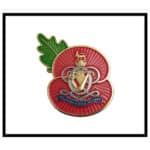Major George Murray Smith, who has died aged 76, was awarded an immediate MC when fighting the Italians in the Western Desert in 1940, a Bar at Sidi Rezegh against a mixed German and Italian force, and a second Bar in Italy in 1945 when fighting the Germans.
George William Murray Smith was born on November 26th, 1917, the son of Major & Murray Smith and Olive Lawson, daughter of the 3rd Lord Burnham. He was educated at Eton and Sandhurst and commissioned into the 7th Hussars in 1936.
He joined the Hussars in Cairo and from the beginning proved an outstanding soldier. His first citation recorded that:
“He went to his squadron leader’s and when he was severely wounded, took control of the squadron and reorganised it for battle. In the face of the enemy, he showed initiative and courage”
In late November 1941, though only a Captain, Murray Smith was recommended for an immediate DSO in the Battle of Sidi Rezegh. He referred to the MC he received instead as his consolation prize.
This battle was marked by Rommel’s enterprising tactics. He also had a “ballistic advantage” supplied by a 50 mm gun with a range of 1,000 yards greater than the British two-pounder, and his tanks’ armour was more resistant than that of the British “Matildas”.
The British suffered 18,000 casualties but inflicted 10,000 more and took 16,000 prisoners; the loss in tanks was great. This action relieved Tobruk and cleared Cyrenaica of the enemy.
After the battle, the 7th Hussars were withdrawn to Cairo and re-equipped with Stuart M3 (Honey) tanks, which were faster, better armed and more agile.
With Murray-Smith as adjutant, the Regiment was despatched hastily to Burma, where the British Army was engaged in a long withdrawal from Rangoon to India.
General Wavell subsequently commented that without the 7th Armoured Brigade (of which the 7th Hussars was part), “We would never have got the Army out of Burma.” Murray-Smith relinquished his appointment as adjutant in June 1942 and returned to command his former ‘B’ Squadron.
The Regiment then served in Paiforce (Persia and Iraq Command) and in May 1944 went to Italy and disembarked at Taranto; they fought under the command of the 2nd Polish Corps from Pescara to the Gothic Line. They then trained with DD tanks (amphibious Shermans) for the Po crossing and spent seven months in the Winter Line as infantry before returning to Lake Bracciano for more training with DD tanks and the actual crossing of the Po.
This was followed by the Canale Biago and the Adige and the race to Venice, which Murray-Smith’s squadron was probably the first to enter. Again he was recommended for a DSO “for initiative. leadership and powers of command which are of the highest order”, and again received instead the consolation prize of a Bar to his MC.
He retired from the Army in 1948, bought a farm at Brinkworth, Wiltshire, and hunted with the Beaufort and Vale of the White Horse. In 1951 he joined the Royal Wiltshire Yeomanry and commanded ‘C’ Squadron until 1958.
Murray-Smith then moved to Ireland, where he hunted in Kilkenny (as Field Master) and Waterford. After the death of his wife in 1988 he returned to Wiltshire.
George Murray-Smith was not, perhaps, an easy man to serve, as his standards were so high. But he was an outstanding squadron leader who had the total loyalty of every man under his command and the unstinted admiration of his brother officers: he never ducked under heavy fire. He had a remarkable gift for radiating confidence.
Murray-Smith married 1940, Phyllis “Billy” Browne; they had a daughter and a son, the trainer David Murray-Smith, whose many successful horses have included a winner of the Irish Grand National.
Reproduced by kind permission of the Daily Telegraph
Related topics
- A short history of The 7th Hussars
- Timeline: Middle East (Egypt and Libya)
- Timeline: Burma 1942
- Timeline: Italy 1943-5
- Gallantry Award: Citation and Award for The Military Cross – 2Lt GW Murray-Smith, 7H
- Gallantry Award: Citation and Award of a Bar to The Military Cross – Capt GW Murray-Smith, MC, 7H
- Gallantry Award: Citation and Award for a Second Bar to The Military Cross – Maj GW Murray-Smith, MC, 7H



